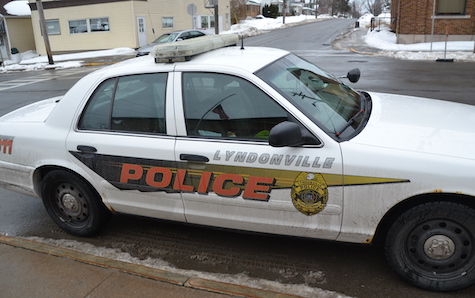Lyndonville, with only a part-time officer, will institute police policies to meet state requirements
No chokeholds and no bias-based profiling among the standards

Photos by Tom Rivers: Lyndonville Village Trustee Darren Wilson, right, and Mayor John Belson discuss policies for the Lyndonville Police Department on Monday. The village will have a 6 p.m. public hearing on March 29 for the community to comment on the new policies.
LYNDONVILLE – The village, which only has one part-time police officer, is working to adopt policies for the department to be in line with an executive order from Gov. Andrew Cuomo.
All law enforcement s agencies in the state, regardless of size, need to submit a plan to the state by April 1. That plan needs to include the department’s use of firearms and force, efforts to build community relationships, a policy against bias-based profiling and how the departments investigate hate crimes.
Lyndonville currently doesn’t have those policies on the books but will be adding them to meet the state deadline. The Village Board discussed the policies on Monday afternoon and will continue the discussion during its March 1 board meeting. The village will have a 6 p.m. public hearing on March 29 to take comments form the community. Residents can also submit written comments online through the village website. (Click here for more information.)

The police patrol car is pictured on Monday afternoon outside the Village Hall on Main Street. The village has one part-time officer.
Bill Larkin has served as the village’s part-time officer since 2006. The mayor, currently John Belson, oversees the department. The officer does road patrol, and enforces local and state laws in a village of 838 residents in 1 square mile.
The officer investigates criminal and civil complaints, as well as domestic disputes and family matters. The officer responds to intrusion alarms and motor vehicle accidents.
Lyndonville is using the policies from the Orleans County Sheriff’s Office as a model to meet the state requirements. Drafts of those policies can be reviewed by clicking here.
Some highlights of the proposed policies include:
Community Relations: Police officers shall be courteous, furnish their name and badge number, and “must treat persons with as much respect as that person will allow. They also must be mindful that the people with whom they are dealing are individuals, with human emotions and needs.”
The Police Department participates in many community events, including the Fourth of July celebration, Halloween, Christmas in Lyndonville celebration, Memorial Day and also events at the school district. The department “is committed to building a stronger community by building trust and relationships through community policing,” the policy states.
Use of Force: The Lyndonville PD bans use of chokeholds.
Police officers, after completing firearms training, shall carry a firearm while on duty. After the required training, sworn officers will carry OC (oleoresin capsicum) spray, a baton or ASP (Armament Systems and Procedures) and an EMD (Electro-Muscular Disruption) system, commonly referred to as an X-26 Taser, the policy states.
Police officers, in the performance of their duties, as authorized to use reasonable and legitimate force in specific cases. This policy, founded in the standards of federal constitutional requirements and state statutes, provides guidance regarding the use and justification for the use of force, including deadly physical force.
Use of Deadly Force: The Lyndonville Village Police Department personnel may use deadly physical force under the following circumstances, and then only when no other reasonable alternative is available:
A. To defend himself or another person when the officer has reasonable cause to believe there is imminent danger of death or serious physical injury to himself or another;
B. To apprehend a resisting person who is committing or has committed a crime in which deadly physical force is being used or threatened and the officer has reasonable cause to believe that such person will cause death or serious injury unless immediately apprehended;
C. To kill a dangerous animal or an animal so badly injured that humanity requires that it be removed from further suffering. In the case of an injured animal, permission of the owner should be obtained, whenever possible. Care should be taken to protect bystanders from a ricocheting bullet and, if possible, avoid killing of an animal in the presence of children.
D. Members of the Lyndonville Village Police Department shall only fire their weapons at a person to stop and neutralize an assailant to prevent him/her from completing a potentially deadly aggressive act or in the instances as described in this section. For maximum stopping effectiveness and minimal danger to innocent bystanders, the officer should shoot at “available target center mass”. The officer’s intent and purpose is only to stop the deadly aggression or prevent the escape of the subject.
E. No distinction shall be made relative to the age or gender of the intended target of deadly physical force.
F. Self-defense and imminent threat of deadly physical force/serious physical injury shall be the guideline for employing deadly force.
Bias-Based Profiling: The village explicitly states that any racial or ethnic profiling by members of the Police Department is strictly prohibited.
“It is the policy of the Lyndonville Village Police Department that all members will not affect a stop, detention, or search of any person which is motivated by race, color, ethnicity, age, gender or sexual orientation,” the policy states.
Investigation of Hate Crimes: Lyndonville will seek to identify and investigate hate crimes in accordance with the Hate Crimes Act of 2000.
“Any acts or threats of violence, property damage, harassment, intimidation, or other crimes motivated by hate and bias and designed to infringe upon the rights of individuals are viewed very seriously by this agency and shall be given high priority,” the policy states. “This agency shall employ necessary law enforcement resources to identify and arrest hate crime perpetrators. Also, recognizing the particular fears and distress typically suffered by victims, the potential for reprisal and escalation of violence, and the far-reaching negative consequences on the community.”





































































